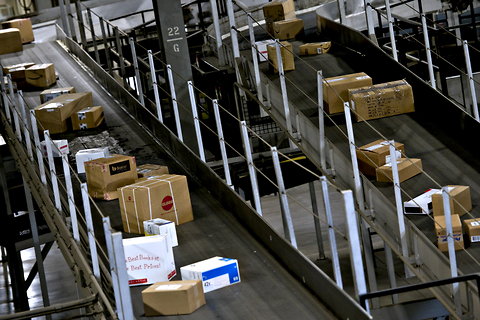Cyber Monday, coined in 2005 by a shopping trade group that noticed online sales spiked on the Monday following Thanksgiving, is the next in a series of days that stores are counting on to jumpstart the holiday shopping season.
It’s estimated that this year’s Cyber Monday will be the biggest online shopping day of the year for the third year in a row: According to research firm comScore, Americans are expected to spend $1.5 billion, up 20 percent from last year on Cyber Monday, as retailers have ramped up their deals to get shoppers to click on their websites.
Amazon.com, which is starting its Cyber Monday deals at midnight on Monday, is offering as much as 60 percent off a Panasonic VIERA 55-inch TV that’s usually priced higher than $1,000. Sears is offering $430 off a Maytag washer and dryer, each on sale for $399. And Kmart is offering 75 percent off all of its diamond earrings and $60 off a 12-in-1 multigame table on sale for $89.99.
Retailers are hoping the deals will appeal to shoppers like Matt Sexton, 39, who for the first time plans to complete all of his holiday shopping online this year on his iPad tablet computer. Sexton, who plans to spend up to $4,000 this season, already shopped online on the day after Thanksgiving known as Black Friday and found a laptop from Best Buy for $399, a $200 savings, among other deals.
“The descriptions and reviews are so much better online so you can compare and price shop and for the most part get free shipping,” said Sexton, who lives in Queens, N.Y., and is a manager at a utility company.
Sexton also said that it’s easier to return an online purchase to a physical store than it had been in previous years. “That helps with gifts,” he said.
How well retailers fare on Cyber Monday will offer insight into Americans’ evolving shopping habits during the holiday shopping season, a time when stores can make up to 40 percent of their annual revenue. With the growth in high speed Internet access and the wide use of smartphones and tablets, people are relying less on their work computers to shop than they did when Shop.org, the digital division of trade group The National Retail Federation, introduced the term “Cyber Monday.”
“People years ago didn’t have … connectivity to shop online at their homes. So when they went back to work after Thanksgiving they’d shop on the Monday after,” said Vicki Cantrell, executive director of Shop.org. “Now they don’t need the work computer to be able to do that.”
As a result, the period between Thanksgiving and Cyber Monday has become busy for online shopping as well. Indeed, online sales on Thanksgiving Day, traditionally not a popular day for online shopping, rose 32 percent over last year to $633 million, according to comScore. And online sales on Black Friday were up 26 percent from the same day last year, to $1.042 billion. It was the first time online sales on Black Friday surpassed $1 billion.
For the holiday season-to-date, comScore found that $13.7 billion has been spent online, marking a 16 percent increase over last year. The research firm predicts that online sales will surpass 10 percent of total retail spending this holiday season. The National Retail Federation estimates that overall retail sales in November and December will be up 4.1 percent this year to $586.1 billion
But as other days become popular for online shopping, Cyber Monday may lose some of its cache. To be sure, Cyber Monday hasn’t always been the biggest online shopping day. In fact, up until three years ago, that title was historically earned by the last day shoppers could order items with standard shipping rates and get them delivered before Christmas. That day changes every year, but usually falls in late December.
Even though Cyber Monday is expected to be the biggest shopping day this year, industry watchers say it could just be a matter of time before other days take that ranking.
“Of all the benchmark spending days, Thanksgiving is growing at the fastest rate, up 128 percent over the last five years,” said Andrew Lipsman, a spokesman with comScore.
Article source: http://www.nytimes.com/aponline/2012/11/25/us/ap-us-cyber-monday.html?partner=rss&emc=rss
 Updating…
Updating…